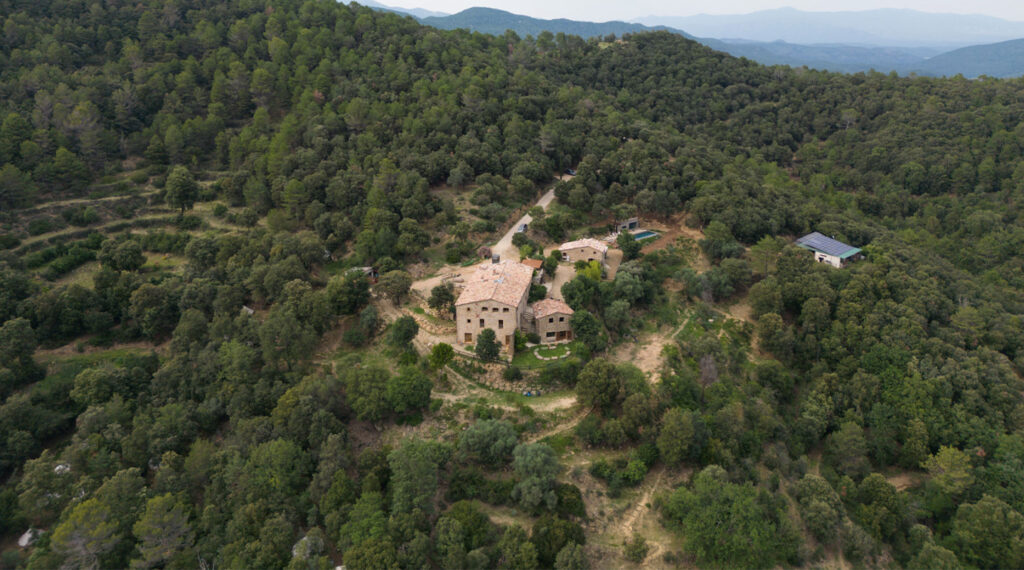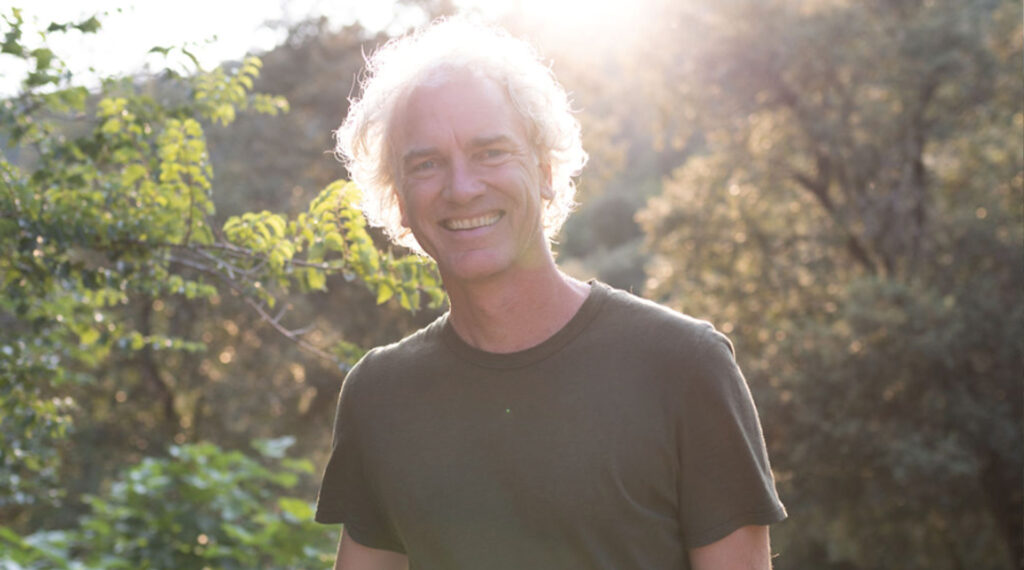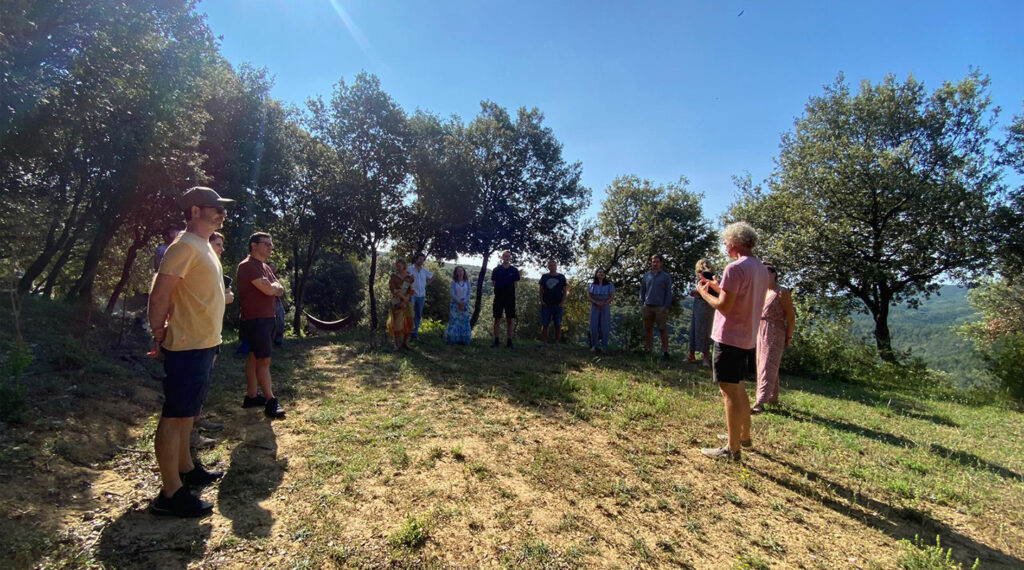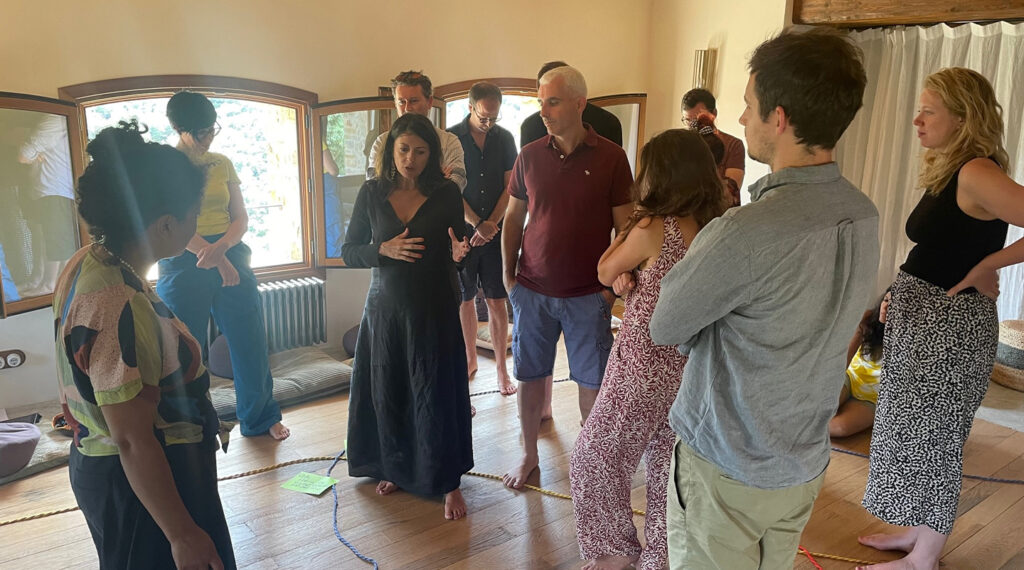On ecosystem, shared values and the long view: How a foundation in Spain creates a blueprint for the future of philanthropy

“When I was 6, my dream was to become a guardian of a forest, and now I finally see this dream become a reality. Living by the rhythm of nature makes me healthier, happier, more empathetic, more embedded”, says Stef van Dongen, the founder of The Home of the Pioneers of Our Time (The Home), in the Muga Valley in Spain, surrounded by 100,000 hectares of centuries-old oak forest. Here, for the first time, Philea and BMW Foundation Herbert Quandt convened Futures Philanthropy in June to discuss the challenges and opportunities facing philanthropy, and the need to embrace the long view for the benefit of today’s and future generations.
The view from the Muga valley in the Pyrenees that opens before your eyes as you approach The Home is spectacular. The dark green, life-breathing forest with its impenetrable, dense network of roots, plants, bushes and trees seems infinite. The hills and mountains of the valley are touching the horizon. High up in the sky you can see a flock of vultures who are making their circles searching for food with their incredible eyesight. You can gaze for hours into the vastness of the Pyrenees mountains and enjoy the silence, interrupted from time to time by the chirping of birds. Yet this beauty is deceptive.
The oak forest is under threat of degradation and biodiversity loss. A former epicentre of the charcoal industry that once brought life and work to the region and was abandoned decades ago is facing rapid decline. It was more than 100 years ago that vultures, the guardians of the forest that serve ecosystems and humans, disappeared from the region. The Muga river is expected to lose 30 percent of its water over the next 30 years. 100,000 hectares of forest and land, on which the entire local agricultural industry and tourist sector of the Costa Brava in Catalonia depends, no longer provide enough water. The danger of drought is in the air.

Soil is water, soil is food, soil is life
This is where Stef van Dongen’s story and the story of The Home of the Pioneers of Our Time, a philanthropic foundation that brings together local authorities, villages, researchers, private investors and innovators, began three years ago. “I used to work a lot in the big cities in Africa, India and Latin America. When you build relationships with people and hear their stories, you realise with time that most of them came from farmland. They moved to the cities because their lands were degrading. Having done some research, I found out that 40% of soil is eroded, while the rest is moving fast in the same direction. And soil is water, soil is food, soil is life. Realising this was a pivotal moment for me”, he says with a soft smile in his eyes and a slight trace of fatigue. Stef Van Dongen, a Dutchman of tall and slender build, with a grey mop of curly hair who spent 20 years in impact investment, private-public partnership and social innovation space in Rotterdam and around the world, has found his new home in Catalonia and, together with the local communities, is helping restore the forest and create a vision for regenerative society that provides jobs and opportunities, while being in harmony with nature.
The Muga valley is one of thousands of watersheds in Europe facing biodiversity loss
Rapid loss of biodiversity that could dramatically impact the whole ecosystem and the economic ties in the region is not unique to the Muga Valley. There are “thousands of valleys like this that are facing economic, ecological and social challenges”, he explains. According to recent research, an estimated 1.6 billion people in rural communities around the globe are affected by the loss of forests and decline of ecosystems and biodiversity. Forests are natural sources of subsistence, livelihoods and health for local communities and indigenous peoples.
Research also found that there is significant resistance to incentive-based market models and purely economic solutions towards reforestation. Forest regeneration takes time and cannot be approached from above. What people value more is connection to the place and nature, a sense of shared values and belonging.
From vulture conservation to a story of shared values and belonging
Creating alignment and shared understanding of what needs to be done was not without challenges in the Muga Valley. Van Dongen’s initial attempt to convince fellow villagers to bring back vultures to regenerate and protect the forest that is indispensable for nature’s sanitation and protection from diseases and was an outcome of the research conducted specifically for the Muga Valley, faced vocal resistance and numerous misconceptions. Vultures that eat the remains of dead prey are often themselves associated with death, while their value for ecosystem restoration is often misunderstood.
It took more than three years of trust building and co-creation. This prompted a narrative change and a clear vision, as it went beyond vulture conservation and reproduction. It was about people and their future, the protection from fire and spread of disease, access to clean water and soil, creation of jobs and opportunities. Ultimately, it was about a shared understanding of what was at the core – people’s own health and wellbeing and that of future generations that depended on the place where they live.
The Home wants to become “a laboratory for Europe, disseminating learnings widely, creating shared governance structures that enable cooperation between philanthropists, investors, public authorities and local communities and establishing new financial models such as climate credits that would enable sustainable future maintenance of the valley for at least seven generations”, says van Dongen with confidence. When I ask him for advice for other philanthropic organisations in Europe, he emphasises the need for philanthropy to think place-based, to invest in building lasting relationships and trust focusing on the long-term vision, and to embrace the new.

Embracing change from within
The Home of the Pioneers of Our Times provided a powerful glimpse into what regenerative futures could like and the role philanthropy could play in contributing to this transition. This set the scene and tone for the discussions at the inaugural Futures Philanthropy gathering, which brought together 20 passionate participants from the wider European philanthropy ecosystem – among them centuries-old and established European foundations such as Compagnia di San Paolo, Gulbenkian Foundation, Adessium Foundation, Mercator Foundation, Joseph Rowntree Foundation and Porticus, philanthropy networks – among them the Italian Association of Foundations Assifero and community foundation support organisation INSPIRE as well as next generation representatives and new foundations – Famtastisch Stiftung and Together Foundation that is in the process of being established.
Deep connection with nature and each other, a sense of shared values and belonging and an urgent need for philanthropy to act were the red threads for participants during the retreat. BMW Foundation’s decades of experience in convening responsible leaders from around the globe helped inform and design the gathering that centred personal connection, reflection and trust as the very foundation for embracing change from within. Some of the key ingredients for creating trust and convening in new ways are leadership and diversity – inviting leaders from different fields and walks of life who are eager to take responsibility; transformative places – convening at inspiring places such as The Home that allow deep encounters and reconnection with the self and nature; or serendipity – deliberately creating spaces for people to connect and trusting that unexpected things can emerge that you haven’t thought of or planned. As Markus Hipp, Board Member of BMW Foundation said, “the gathering is successful when everyone had a possibility to have a deep conversation with every single person of the event, not just a small talk.”
Inner change leads to outer change
Societal transformation is deeply connected with inner transformation, but often we forget about ourselves and what gives us strength and power to continue our work. The Inner development goals movement puts emphasis on individual wellbeing to being able to achieve sustainable development goals. Gus Speth, the founder and former president of the World Resources Institute, puts it pointedly: “I used to think the top environmental problems were biodiversity loss, ecosystems collapse and climate change. I thought that with 30 years of good science we could address those problems. But I was wrong. The top environmental problems are selfishness, greed and apathy”.
Current crises are not climate change, democracy backsliding or rising inequalities, but rather lack of empathy and listening, a disconnection from reality and lack of agency. The problems are too big to be solved by an individual organisation or sector. Yet change is not only disruptive, but also incremental. It starts with the belief in ourselves, our agency and the notion of hope that tomorrow will be better than today. Inner change leads to outer change.

It is not us versus them. Not them versus us. We are the change
By looking into the three horizons model and embodying the change we want to see, we reached a consensus that we need the full spectrum of philanthropy to be working together towards a common goal, while the pathways and perspectives towards regenerative futures will be inevitably diverse. This is not about focusing only on innovators in the field or only on emerging practices, but about collaborating with each other and reinforcing each other. While innovators, next gen and emerging practitioners can be a source of inspiration for new ways of working and a playground for experimentation, the wider philanthropy sector, with its deep knowledge of social challenges, established structures and access to assets, financial, intellectual, and relational resources, can be an ally and a strong reinforcement of emerging ideas and prototypes.
The oak forest of the Muga Valley became the context, the reminder and the inspiration for Futures Philanthropy that aims at building a broad, inclusive and open coalition of funders and philanthropy networks in Europe to embrace transition towards regenerative societies. This powerfully connects with the metaphor of the forest that the wider Philea community has chosen to describe the European philanthropy sector as a living system. Philanthropy has a tremendous variety of roles to play and has different means of operating, while being rooted in the same soil and thriving in the same ecosystem. Soil is water, soil is food, soil is life. Futures Philanthropy is an invitation to everyone to explore 21st century philanthropy, ask powerful questions and collaborate in new ways focusing not on short-term outcomes, but on the long view. As Ondrej Liška, Regional Director Europe at Porticus explained, “The world is complex, and we might never have all the answers. What we know is that we need to act, using the best of our collective wisdom we have right now”.
Authors

